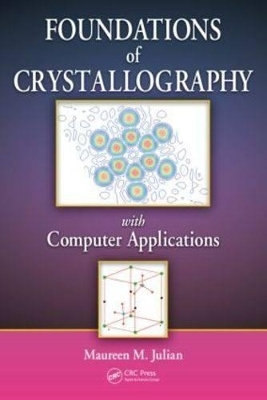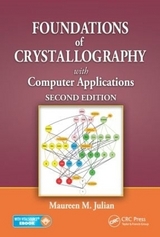
Foundations of Crystallography with Computer Applications
Crc Press Inc
978-1-4200-6075-1 (ISBN)
- Titel erscheint in neuer Auflage
- Artikel merken
X-ray crystallography provides a unique opportunity to study the arrangement of atoms in a molecule. This book’s modern computer-graphics centered approach facilitates the extrapolation of these valuable observations. A unified treatment of crystal systems, the book explains how atoms are arranged in crystals using the metric matrix. Featuring two model crystal examples, the text develops theoretical concepts to point and space groups in two dimensions and then extends these ideas to three dimensions.
The book interprets the International Tables for Crystallography to bridge the gap between the crystallographic literature and spatial interatomic relationships. Numerous computer-based exercises are integrated throughout the book, with MATLAB® starter programs that help reduce the minutiae of programming.
LATTICES Two-Dimensional Lattices
Two-Dimensional Basis Vectors and Unit Cells
Two-Dimensional Transformations between Sets of Basis Vectors
Three-Dimensional Basis Vectors, Unit Cells, and Lattice Transformations
Conversion to Cartesian Coordinates
A Crystal: Hexamethylbenzene
A Crystal: Anhydrous Alum
Effects of Temperature And Pressure On LatticeParameters
UNIT CELL CALCULATIONS
Fractional Coordinates
Plotting Atoms in the Unit Cell
Calculation of Interatomic Bond Distances
Calculation of Interatomic Bond Angles
Area and Volume of the Unit Cell
Summary of Metric Matrix Calculations
Quartz Example
Transformation Matrices
Hexamethylbenzene Example
Crystallographic Directions
Crystallographic Planes and Miller Indices Density
Revisiting Thermal Expansion and Isothermal Compressibility
POINT GROUPS
Group Theory
Symmetry Operations
Crystallographic Rotations
Summary of the Two-Dimensional Crystallographic Operations
Two-Dimensional Crystallographic Point Groups
Two-Dimensional Crystal Systems
Two-Dimensional Point Group Tree
Three-Dimensional Point Groups
Three-Dimensional Crystal Systems
Examples of Three-Dimensional Point Groups With Multiple Generators
Three-Dimensional Point Group Trees
Point Group Symmetry and Some Physical Properties Of Crystals
SPACE GROUPS
Two-Dimensional Bravais Lattices
Crystal Systems and the G Matrices
Two-Dimensional Space Groups
Overview of the Asymmetric Unit
Recipe for Analyzing a Periodic Pattern
Primitive Cells for Cm and C2mm
Two-Dimensional Space Group Tree
Summary of Two-Dimensional Space Groups
Three-Dimensional Bravais Lattices
Three-Dimensional Space Groups
Hmb and Space Group No. 2, P1
Aa and The Space Group No. 150, P321
THE RECIPROCAL LATTICE
The Reciprocal Lattice
Relationships between Direct and Reciprocal Lattices
Reciprocal Lattice Calculations for Three Crystals
Relationships between Transformation Matrices
Diffraction Pattern and the Reciprocal Lattice
Three Applications of the Reciprocal Lattice
PROPERTIES OF X-RAYS
The Discovery of X-Rays
Properties of Waves
X-Ray Spectrum
The X-Ray Tube
X-Ray Diffraction
ELECTRON DENSITY MAPS
Scattering by an Electron
Scattering by an Atom
Scattering by a Crystal
Some Mathematical Identities
Structure Factors for Some Crystals
Structure Factors for Centrosymmetric Crystals
Electron Density Maps
| Erscheint lt. Verlag | 24.4.2008 |
|---|---|
| Zusatzinfo | 422 equations; 88 Tables, black and white; 339 Illustrations, color; 300 Illustrations, black and white |
| Verlagsort | Bosa Roca |
| Sprache | englisch |
| Maße | 178 x 254 mm |
| Gewicht | 907 g |
| Themenwelt | Mathematik / Informatik ► Informatik ► Theorie / Studium |
| Naturwissenschaften ► Chemie | |
| Naturwissenschaften ► Geowissenschaften ► Mineralogie / Paläontologie | |
| ISBN-10 | 1-4200-6075-9 / 1420060759 |
| ISBN-13 | 978-1-4200-6075-1 / 9781420060751 |
| Zustand | Neuware |
| Haben Sie eine Frage zum Produkt? |
